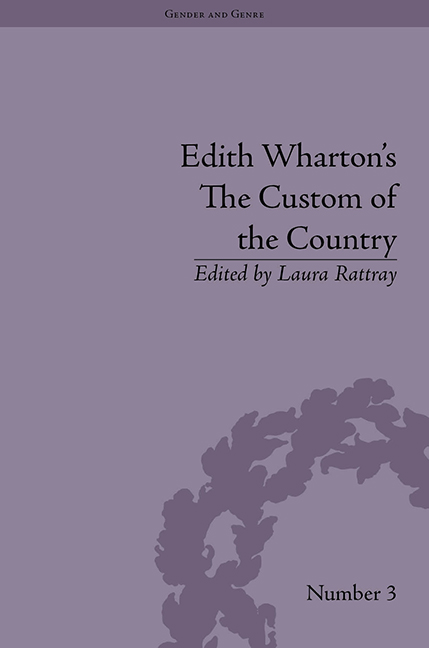Book contents
- Frontmatter
- CONTENTS
- Acknowledgements
- Editorial Note
- List of Contributors
- List of Figures
- Introduction
- 1 The Custom of the Country: Edith Wharton's Conversation with the Atlantic Monthly
- 2 When the Reading Had to Stop: Readers, Reading and the Circulation of Texts in The Custom of the Country
- 3 ‘Don't Cry – it ain't that Kind of a Story’: Wharton's Business of Fiction, 1908–12
- 4 Worst Parents Ever: Cultures of Childhood in The Custom of the Country
- 5 Crude Ascending the Staircase: Undine Spragg and the Armory Show
- 6 ‘It's Better to Watch’: Compulsive Voyeurism in The Custom of the Country and The House of Mirth
- 7 A ‘Mist of Opopanax’: Mapping the Scentscape of The Custom of the Country
- 8 Landscape with the Fall of Undine
- 9 Girls from the Provinces: Wharton's Undine Spragg and Cather's Thea Kronborg
- 10 Men at Work in The Custom of the Country
- 11 ‘Lost in Translation’: Financial Plots and the Modernist Reader in The Custom of the Country
- Notes
- Index
2 - When the Reading Had to Stop: Readers, Reading and the Circulation of Texts in The Custom of the Country
- Frontmatter
- CONTENTS
- Acknowledgements
- Editorial Note
- List of Contributors
- List of Figures
- Introduction
- 1 The Custom of the Country: Edith Wharton's Conversation with the Atlantic Monthly
- 2 When the Reading Had to Stop: Readers, Reading and the Circulation of Texts in The Custom of the Country
- 3 ‘Don't Cry – it ain't that Kind of a Story’: Wharton's Business of Fiction, 1908–12
- 4 Worst Parents Ever: Cultures of Childhood in The Custom of the Country
- 5 Crude Ascending the Staircase: Undine Spragg and the Armory Show
- 6 ‘It's Better to Watch’: Compulsive Voyeurism in The Custom of the Country and The House of Mirth
- 7 A ‘Mist of Opopanax’: Mapping the Scentscape of The Custom of the Country
- 8 Landscape with the Fall of Undine
- 9 Girls from the Provinces: Wharton's Undine Spragg and Cather's Thea Kronborg
- 10 Men at Work in The Custom of the Country
- 11 ‘Lost in Translation’: Financial Plots and the Modernist Reader in The Custom of the Country
- Notes
- Index
Summary
In her first New York society dinner at the Fairfords', the relentlessly upwardly mobile but intellectually ill-prepared anti-heroine Undine Spragg is ambushed by the highbrow conversation at the table, and is forced to concede the limitations of her own literary knowledge: ‘she had read no new book but “When the Kissing Had to Stop”, of which Mrs Fairford seemed not to have heard’ (p. 37). Surprisingly, Undine's recollection is not of a cheap popular novel, as we might expect from her social and cultural background, but of the famous lines from Browning's poem ‘A Tocatta of Galuppi's’, a mid-nineteenth-century elegiac musing on eighteenth-century Venetian hedonism, first published in the critically acclaimed collection Men and Women (1855):
As for Venice and her people, merely born to bloom and drop
Here on earth they bore their fruitage, mirth and folly were the crop:
What of soul was left, I wonder, when the kissing had to stop?
Elaine Showalter has interpreted this small social humiliation, exposing the limited frame of Undine's cultural reference, as uncontested evidence of authorial criticism, and even disapproval; Wharton, Showalter unequivocally argues, ‘mocks Undine's ignorance in reading “When the Kissing had to Stop”’. Show-alter's assessment of Undine's reading is reductive and absolute, and, I would suggest, closed to the multiple interpretative possibilities suggested by almost any act of reading or allusion to a text.
Information
- Type
- Chapter
- Information
- Edith Wharton's The Custom of the CountryA Reassessment, pp. 29 - 42Publisher: Pickering & ChattoFirst published in: 2014
